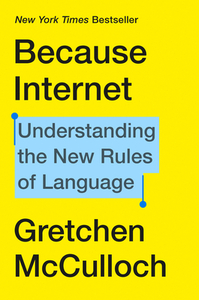Take a photo of a barcode or cover
Super interesting! Though I will say it did not lend itself well to the audiobook format
funny
informative
slow-paced
informative
lighthearted
medium-paced
funny
informative
lighthearted
relaxing
medium-paced
Oh man this book was fun. I love learning about the history of technology almost as much as I like learning about the idiosyncrasies of the English language. This book has both!
And since, I've come to the conclusion that extroverts have taken over the virtual world just as thoroughly as they have the physical one, I've taken to using these reviews as a place to keep my notes on books. What follows isn't so much a review as it is a list of nuggets I found fascinating and/or funny. If that's not what you're looking for in a review, move along...nothing to see here...
Because of the ‘Net more people than ever are writing on a daily basis.
If a published writer is someone whose words are read by more than 100 people, then most peeps on Social Media are published writers.
The more common a word the shorter it tends to be.
The word “acronym” enter English not until 1940
“We use emoji less to describe the world around us and more to be fully ourselves online.” p.14
Geo-tagging posts helps linguists study regional dialects
“Mafted” is a British term meaning exhausted from heat, crowds, or exertion. P. 25
The book “Kitchen Table Lingo” found that there is 57 familects for the TV Remote
“Women tend to learn language from their peers; men learn from their mothers.” 34
The following changes were made because they looked like latin words and the Latin-worshipping English “authorities” said Latin should be our model
Dete became debt (debitum)
Samoun became salmon (salmonen)
Iland became island (insula)
“Bias-laundering” 46
“On fleek” was coined by vine user Peaches Monroee (51)
I love how the net allows for such targeted tracking
“Columbusing” when a white people try to take credit for “discovering” something another culture has already been using (51)
“Internet writing is a distinct genre with its own goals, and to accomplish those goals successfully requires subtly tuned awareness of the full spectrum of the language” (60)
The www started in ‘89, I thought it was ‘96
Internet acronyms have been in use since at least ‘77 (72)
UTSL = “Use the Source, Luke!” aka read the source code before asking questions (74)
2000 = the year 75% of Americans used the internet (76)
Facebook was the first social media platform that overtly linked the offline (read: IRL) world with the online world. (80)
We should change “lol” to “ne” because that’s what we do (nose exhale). So says David Crystal in 2001. (91)
Jessamyn West, the librarian, and her tech help is mentioned on page. 94.
Context collapse is when friend from different areas of your life see what you’re doing/thinking when you’re with the other groups that they don’t normally see you with, so sayeth danah boyd (103)
The # comes from rushingly writing “lb” from that Latin “libra pondo”, per pound. (129)
The “tag” part of hashtag comes from the tag on a T-shirt, it gives you information about the shirt itself just as the hashtag gives you info on the tweet or post.
The ! was used before the @ for email. Ex: art!alex meant Alex on the Art server. Now it would read [email protected] (132)
Scott Fahlman, in 1982, @ Carnegie Melon University, proposed :-) as a joke marker on the message boards to avoid confusion.
The printing press took the pictures out of books. It’s tough to create pi (what they call the stamps) for pictures. So the illustrated manuscript go bye-bye!
It wasn’t until 2010 that the Unicode Consortium standardized emoji coded even though they’d been in use since the 90s, when there were 608 different emoji and up to 100 new ones each year. The issue of codes being displayed differently from one manufacturer to another, for instance a Zodiac sign became a cow (187) needed to be cleaned up.
People didn’t say hello in person until it became the standard phone greeting. (202)
And since, I've come to the conclusion that extroverts have taken over the virtual world just as thoroughly as they have the physical one, I've taken to using these reviews as a place to keep my notes on books. What follows isn't so much a review as it is a list of nuggets I found fascinating and/or funny. If that's not what you're looking for in a review, move along...nothing to see here...
Because of the ‘Net more people than ever are writing on a daily basis.
If a published writer is someone whose words are read by more than 100 people, then most peeps on Social Media are published writers.
The more common a word the shorter it tends to be.
The word “acronym” enter English not until 1940
“We use emoji less to describe the world around us and more to be fully ourselves online.” p.14
Geo-tagging posts helps linguists study regional dialects
“Mafted” is a British term meaning exhausted from heat, crowds, or exertion. P. 25
The book “Kitchen Table Lingo” found that there is 57 familects for the TV Remote
“Women tend to learn language from their peers; men learn from their mothers.” 34
The following changes were made because they looked like latin words and the Latin-worshipping English “authorities” said Latin should be our model
Dete became debt (debitum)
Samoun became salmon (salmonen)
Iland became island (insula)
“Bias-laundering” 46
“On fleek” was coined by vine user Peaches Monroee (51)
I love how the net allows for such targeted tracking
“Columbusing” when a white people try to take credit for “discovering” something another culture has already been using (51)
“Internet writing is a distinct genre with its own goals, and to accomplish those goals successfully requires subtly tuned awareness of the full spectrum of the language” (60)
The www started in ‘89, I thought it was ‘96
Internet acronyms have been in use since at least ‘77 (72)
UTSL = “Use the Source, Luke!” aka read the source code before asking questions (74)
2000 = the year 75% of Americans used the internet (76)
Facebook was the first social media platform that overtly linked the offline (read: IRL) world with the online world. (80)
We should change “lol” to “ne” because that’s what we do (nose exhale). So says David Crystal in 2001. (91)
Jessamyn West, the librarian, and her tech help is mentioned on page. 94.
Context collapse is when friend from different areas of your life see what you’re doing/thinking when you’re with the other groups that they don’t normally see you with, so sayeth danah boyd (103)
The # comes from rushingly writing “lb” from that Latin “libra pondo”, per pound. (129)
The “tag” part of hashtag comes from the tag on a T-shirt, it gives you information about the shirt itself just as the hashtag gives you info on the tweet or post.
The ! was used before the @ for email. Ex: art!alex meant Alex on the Art server. Now it would read [email protected] (132)
Scott Fahlman, in 1982, @ Carnegie Melon University, proposed :-) as a joke marker on the message boards to avoid confusion.
The printing press took the pictures out of books. It’s tough to create pi (what they call the stamps) for pictures. So the illustrated manuscript go bye-bye!
It wasn’t until 2010 that the Unicode Consortium standardized emoji coded even though they’d been in use since the 90s, when there were 608 different emoji and up to 100 new ones each year. The issue of codes being displayed differently from one manufacturer to another, for instance a Zodiac sign became a cow (187) needed to be cleaned up.
People didn’t say hello in person until it became the standard phone greeting. (202)
informative
medium-paced
An interesting book! I doubt I'll recommend it to many because it's a less common conversation topic for me. That said, this is the best pop modern linguistics book I've read. Yes I'm aware that narrows it down a lot.
Like a 3/3.5
Much of it was very interesting, however I remember why I found linguistics so head spinning in college.
Much of it was very interesting, however I remember why I found linguistics so head spinning in college.
informative
inspiring
fast-paced
funny
informative
lighthearted
medium-paced






